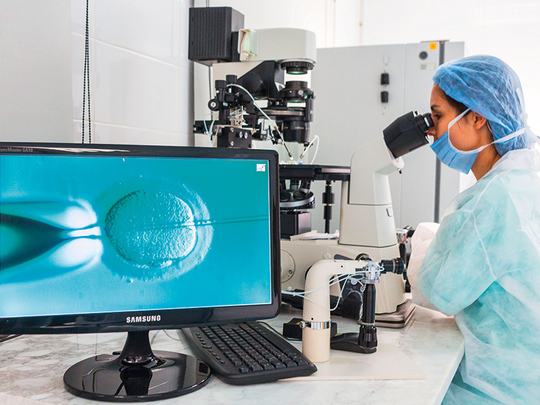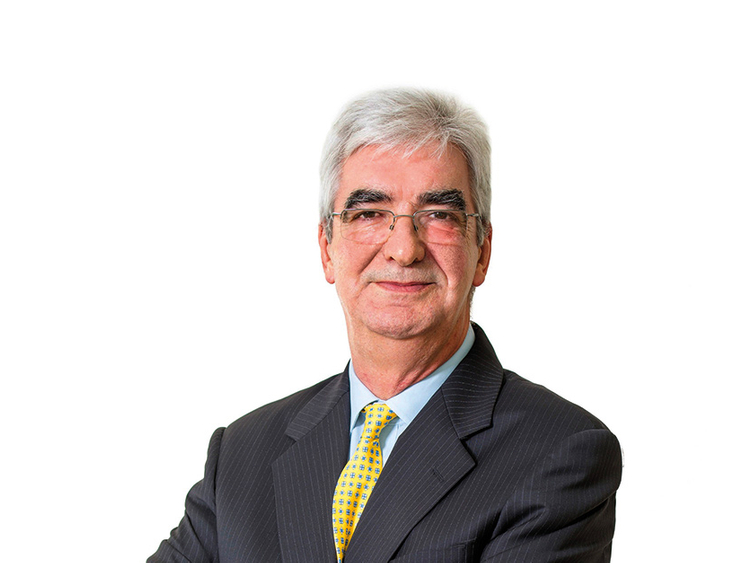
Dubai: Couples who are trying for a second baby may not be as lucky.
While the number of young couples opting for In Vitro Fertilisation (IVF) treatment is on the rise, secondary infertility has proven to be an obstacle for many women, Dr David Robertson, Group medical Director, Bourn Hall International told Gulf News on the occasion of World IVF Day observed on July 25.
After having a smooth first-time pregnancy, many couples are surprised to face difficulties in conceiving again, and carrying a pregnancy to term without having to resort to assisted reproductive technologies or fertility medications.
For 40-year-old housewife Pakistan, who only gave her initials Z.R., getting pregnant was always a challenge.
After getting married at the age of 31, she was unable to conceive the following year after which she was diagnosed with polycystic ovarian syndrome (PCOS).
“After visiting the doctor, I was told to get an ovulation study done, which is when I discovered that I have PCOS. During the treatment for the condition, I conceived naturally, but had a miscarriage,” explained Z.R.
Holding on to hope, the couple continued to seek treatment with the faith they will one day become parents.
Z.R. underwent three cycles of intrauterine insemination (IUI), a fertility treatment that involves insemination into a woman’s uterus to facilitate fertilisation, followed by two cycles of IVF.
“All five cycles of IUI and IVF were unsuccessful. I was told the quality of my eggs was not great, and I needed to lose weight before giving IVF another try,” said Z.R.
Ecstatic
A few months later, Z.R. was ecstatic to have conceived naturally, and welcomed baby Sakina at the end of 2013.
“A year and a half later, we started trying for a second child, but we have had no luck yet. I also broke my leg last year, which has delayed my exercise plan to lose weight before opting for IVF again,” said Z.R.
Describing the experience as “overwhelming”, Z.R. referred to the disappointment, cost and effort she had to endure with her husband during each unsuccessful cycle of treatment.
“What helped us is a strong support system around us, including family members, in-laws, and friends. My employer was also helpful and supportive whenever I needed to step out of the office,” said Z.R.
She shared a message of advice to women of all ages highlighting that “these fertility issues are more common than people think”.
“When to have a baby is a personal decision, but each woman should get regular check-ups and know her system and find out the risks of any complications she may have, especially if she plans to delay pregnancy to after the age of 30.”
Statistics revealed by Bourn Hall Fertility Centre suggest that 43 per cent of the couples who underwent IVF treatment in 2016 belonged to the age bracket of 18 to 34, which is a rise from 36 per cent recorded last year.
According to the statistics, one in five women experiencing infertility issues face secondary infertility.
How to identify complications
Couples under 35 years should seek advice after a year of unsuccessfully trying to conceive, said Dr Robertson.
He explained that, while secondary infertility tends to be more of a female issue as maternal age plays a very significant role, women over 35 should seek advice six months after unsuccessfully trying to get pregnant.
If a woman is trying to have her second baby in her thirties, it could be much harder the second time around, as female fertility starts decreasing after 30.
“Problems can also occur after a woman gives birth, associated with the delivery that could increase her risk of secondary infertility,” said Dr Robertson.
Another factor that plays a role in secondary fertility is that couples have less time to try and conceive for the second or third child, as they are so busy looking after the child/children they have.
“Couples who have had a previous pregnancy often think of themselves as having ‘normal’ fertility, but this isn’t always the case. That’s why it’s important for both the man and woman to have a complete infertility workup as soon as they feel they’re having trouble conceiving,” advised Dr Robertson.
For couples who have conceived a first child with ease, it may be very emotionally distressing having difficulty conceiving the second or subsequent baby.
Dr Robertson said it has been observed that couples facing secondary infertility find it harder to receive social support compared to those experiencing primary infertility as there is no loss in the family.
“Some parents may feel guilty, or a sense of selfishness, for not providing a sibling for their only child, or for delaying a second pregnancy until it became “too late” to conceive,” he explained.
Recommended tests to diagnose the cause of infertility
A sperm count (semen analysis) for the man
Blood tests for the woman, to check her hormone levels
An ultrasound scan of the woman’s uterus and ovaries, and a check of her Fallopian tubes, to see if there is any anatomical problem
Other tests may be needed in particular circumstances
How is secondary infertility treated?
An assessment on the female and male is done to determine the cause of infertility
Based on the doctor’s diagnosis, a fertility treatment plan is proposed, which could include medications, ovulation monitoring, IUI or IVF/ICSI
If the woman’s age is above 35, or it’s a case of male infertility, IVF/ICSI is recommended as it will produce the highest chance of a successful pregnancy
Types of treatment
Intrauterine insemination (IUI): A fertility treatment that involves insemination into a woman’s uterus to facilitate fertilisation
In Vitro Fertilisation (IVF): It is a process of fertilisation where an egg is combined with sperm outside the body, before being transferred into the woman’s uterus.
Intracytoplasmic Sperm Injection (ICSI): It is a specialised form of In Vitro Fertilisation (IVF) that is used for the treatment of severe cases of male-factor infertility. ICSI involves the injection of a single sperm directly into a mature egg.













